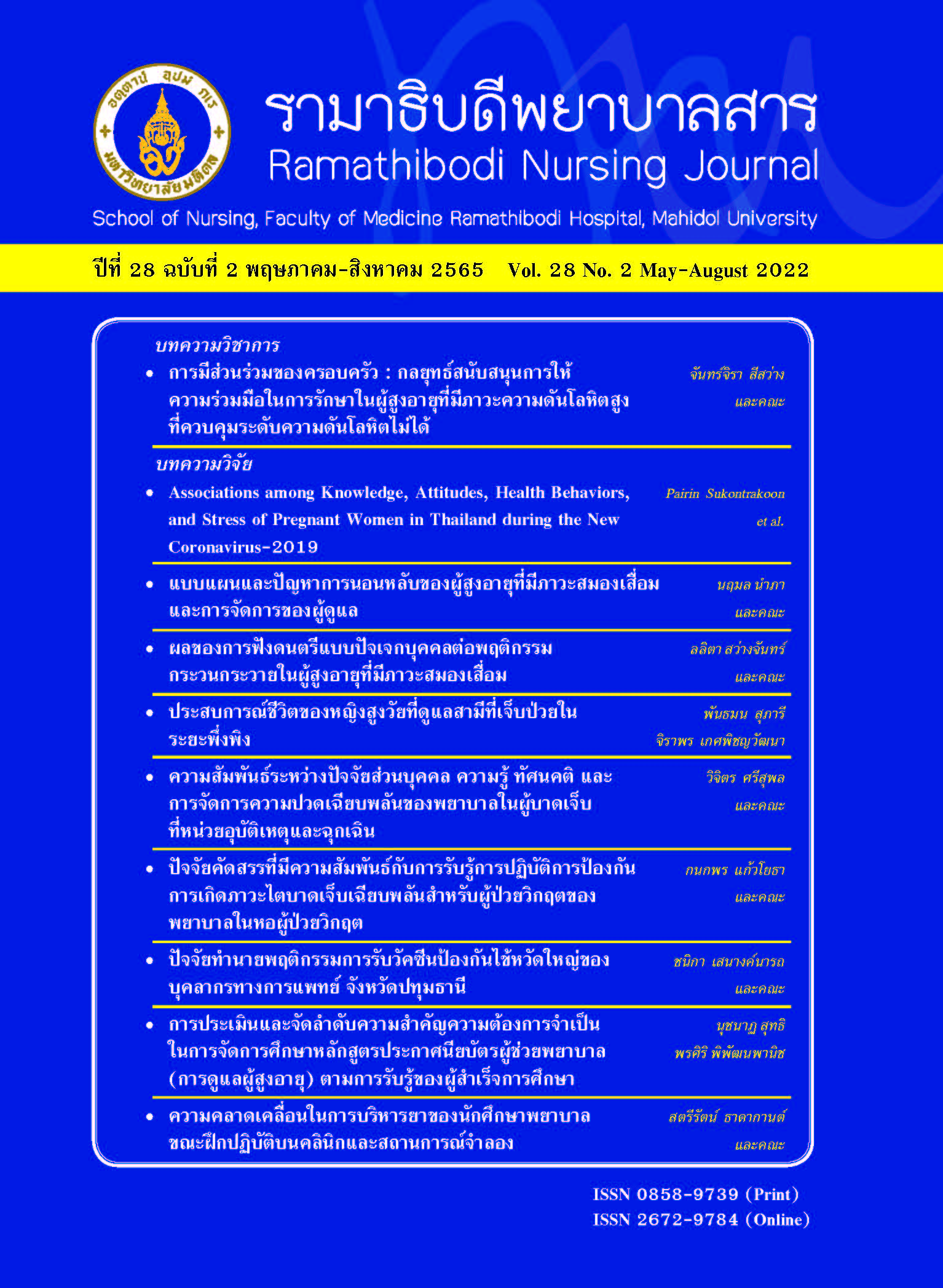Factors Predicting the Influenza Vaccination Behaviors among Healthcare Workers in Pathumthani Province
Main Article Content
Abstract
Abstract
This descriptive predictive research study aimed to examine factors predicting the influenza vaccination behaviors among healthcare workers in Pathumthani Province.The PRECEDE-PROCEED model was applied for the research framework. A sample workers of 358 healthcare workers was recruited from primary, secondary, and tertiary hospitals in Thailand using multi-stage sampling. Data were collected using self-administered questionnaires from January to February 2021. Eight questionnaires were used to assess demographic data, influenza vaccination experience, attitude towards Influenza vaccine,access to care, being prompted, recognition of vaccine policy, persuasion from other persons, and influenza vaccination behaviors. Data were analyzed using descriptive statistics and binary logistic regression analysis. The results revealed that 78.8% of healthcare workers received influenza vaccination. The significant factors predicting the influenza vaccination behaviors among healthcare workers were age, influenza vaccination experience, and persuasion from other persons. Participants under 45 years of age were 2.33 times more likely to have influenza vaccination than those aged 45 years or over.Those with good vaccination experience were 46.34 times more likely to have influenza vaccination than those without good vaccination experience. Those highly persuaded by others were 2.54 times more likely to have influenza vaccination than those less persuaded by others. These findings can be used to create or set up a program to promote influenza vaccination behaviors among healthcare workers.
Keywords: Predictive factor, Influenza vaccine, Vaccination behaviors, Healthcare
Article Details

This work is licensed under a Creative Commons Attribution-NonCommercial-NoDerivatives 4.0 International License.
บทความ ข้อมูล เนื้อหา รูปภาพ ฯลฯ ที่ได้รับการตีพิมพ์ในรามาธิบดีพยาบาลสาร ถือเป็นลิขสิทธิ์ของวารสาร หากบุคคลหรือหน่วยงานใดต้องการนำทั้งหมดหรือส่วนหนึ่งส่วนใดไปเผยแพร่หรือเพื่อกระทำการใด ใด จะต้องได้รับอนุญาตเป็นลายลักษณ์อักษรจากรามาธิบดีพยาบาลสารก่อนเท่านั้น
References
World Health Organization. Seasonal influenza. WHO;2019 [cited 2019 January 4]. Available from: World Health Organization Web site: https://www.euro.who.int/en/health-topics/communicable-diseases/influenza/seasonal-influenza
Bureau of Epidemiology, Department of Disease Control,Ministry of Public Health, Thailand. Reports in the surveillance system 506 influenza; 2020 [cited 2020 January 13]. Available from Bureau of Epidemiology Web site: http://www.boe.moph.go.th/boedb/surdata/
disease.php?ds=15 (in Thai)
Bureau of General Communicable Diseases, Department of Disease Control, Ministry of Public Health, Thailand. Advice on vaccination in healthcare and public health personnel; 2019 [cited 2019 January 15]. Available from Department of Disease Control Web site: http://e-lib.ddc. moph.go.th/pdf/material_453/material_453.pdf(in Thai)
Lohsunthorn P. Epidemiology. 8th ed. Bangkok: CU Print;2013. (in Thai)
Bureau of Information Office of the Permanent Secretary,Department of Disease Control, Ministry of Public Health.Influenza vaccination; 2016 [cited 2019 March 5].Available from Department of Disease Control Web site:http://beid.ddc.moph.go.th/th/diseases/253
Lee PH, Benjamin JC, Lin Y. Seasonal influenza vaccination among Chinese health care workers. Am J Infect Control. 2017;45(5):575-78.
Tanavikrankoon M. Acceptance of seasonal influenza vaccination among medical personnel in a super tertiary care hospital, Bangkok. Vajira Nursing Journal. 2015;17(2):15-30. (in Thai)
Ponjaroen S. Predicting factors of receiving influenza type A H1N1 vaccine among health care workers. Nursing Journal.
;43(5):196-206. (in Thai)
Chanthatero K, Boonmark P, Kimsri N, Kamolsukyuenyong A, Charoentum N. Factors related to influenza A (H1N1)vaccination among healthcare workers in Prapokklao Hospital. Journal of Prapokklao Hospital Clinical Medical Education Center. 2011;28(2):85-97. (in Thai)
Sanlung T, Soitong K, Thawisap K, Lanamtieng T,Areesawangvong P, Komonpaisarn W, et al. Factors associated with the uptake of Influenza vaccine among the health care workers and personal staff in Faculty of Medicine, Khon Kaen University. Srinagarind Medical
Journal. 2013;28(2):229-38. (in Thai)
Kung YM. Factors associated with health care personnel influenza vaccination behavior. J Nurse Pract. 2013;9(2):87-92.
Mangmeesrisuk P, A/H1N1 2009 Vaccine acceptance in health care workers experienced in pandemic influenza;2011 [cited 2019 January 20]. Available from Queen Sirikit National Institute of Child Health Web site: http://library.childrenhospital.go.th/elib/multim/km/723.pdf (in Thai)
Thepsupha S, Maithong N, Thanakamdee S, Tiantong W.actors associated with influenza vaccination among healthcare workers in Bamrasnaradura Infectious Diseases Institute. Journal of Bamrasnaradura Infectious Diseases Institute. 2016;10(2):94-117. (in Thai)
Jennifer LE, David CM, Kathleen MM, Richard AK,Richard AM. Access, education and policy awareness:predictors of influenza vaccine acceptance among healthcare workers. Infect Control Hosp Epidemiol.2017;38(8):970–5.
Theo L, David M, Kath W, Katy S. Amanda S. Seasonal influenza vaccination of healthcare workers: systematic review of qualitative evidence. BMC Health Services Research. 2017;17(1):1-8. doi: 10.1186/s12913-017-2703-4.
Lehmann BA, Ruiter RAC, Van Dam D, Wicker S, KOK G.Sociocognitive predictors of the intention of health care workers to receive the influenza vaccine in Belgain, Dutch and German hospital settings. J Hosp Infect. 2015;89(3):202-9.
Mosoongnern W. An investigation of the public health communication in response to the 2009 influenza outbreak by the Public Health Ministry of Thailand. Journal of Nursing and Education. 2011;4(3):2-15. (in Thai)
Green LW, Kreuter MW. Health program planning: an educational and ecological approach. 4th ed. New York:McGraw Hill; 2005.
Pratumchompoo K. Factor of motivation protection in diseases affecting services influenza vaccination in the elderly Sansuk
subdistrict, Muang Chonburi district, Chonburi province[thesis]. Chonburi: Burapha University; 2016. (in Thai)
Krongyuth P, Khumkaew J, Sarati P, Sukaree W. Factors associated with the intension to receive influenza vaccination among elderly people with chronic diseases: Warinchamrab district, Ubon Ratchathani province. Journal of Science and Technology Mahasarakham University. 2018;37(6):815-22. (in Thai)
Strategy and Planning Division, Ministry of Public Health. Public Health Personnel Information Report 2018; [cited 2019 December 20]. Available from Strategy and Planning Division Web site: http:// bps. moph.go.th/new_bps/sites/default/files/Ministry%20of%20Public%20Health%20 personnel%202561.pdf (in Thai)
Srisatitnarakun B. Development and validation of research instruments: psychometric properties. Bangkok: CU Print;2012. (in Thai)
Steven J. Applied multivariate statistics for the social sciences. 3rd ed. New Jersey: Lawrence Erlbaum Associates;1996.
Limpawittayakul M, Taisuwan PK. Risk perceptions and influenza vaccination in high risk groups. 1st ed. Bangkok:
Danex Intercorporation; 2015. (in Thai)
Coracc K, Prematunge C, McCarthy A, Nair R, Roth V,Hayes T. Predicting influenza vaccination uptake among health care works: what are the key motivatiors? Am J Infect Control. 2013;41(8):679-84.


